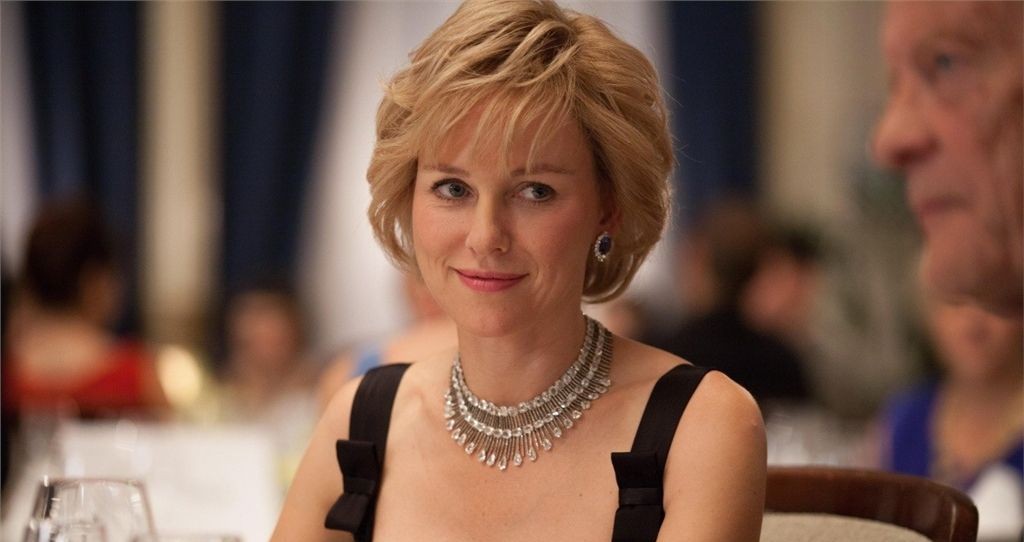An odd film that, despite being complete rubbish in pretty much every respect, still delivered a bit of an emotional punch by the end. Indeed, two of my initial criticisms may perhaps work in its favour. This is of course the story of Princess Diana, portrayed here by Naomi Watts, who was once a potential candidate for the British throne, but who met an untimely death on a Parisian road in 1997 after the Paparazzi (incidentally this word is generally accepted to have derived from Fellini’s ‘La Dolce Vita’ and the character name of the press photographer – Paparazzo) hounded her car and the inebriated driver panicked and lost control of the vehicle. Or it was a professional hit, if you prefer the conspiracy theory. To go back to the aforementioned criticisms, the film opens on that fateful night as we see Diana getting ready to head down to her waiting car, and she suddenly stops and looks back down the empty corridor behind her – and as she does so the camera zooms backward. I assume this is to give the impression of the photographers spying on her/we the current voyeurs looking back on a fairly tragic human life, but for the audience it just looks weird, and certainly does not herald well what follows. Bizarrely it’s now one of the images I remember most about the film, and I’m wondering if it ultimately didn’t help deliver a sort of haunting/haunted feeling. We never see the crash, and again initially I thought this was something of a cop out, as if they were too afraid of a possible backlash and yet shot in the right way it could have really hammered home the main point the film tries to make about the invasion of celebrity privacy by the press. Perhaps though, since most people are very aware of what happened, not filming the event has a greater impact, I’m still undecided on this point ….
In any case, the film focuses on the life of the Princess after she separated from Prince Charles but before they became officially divorced, and it primarily concerns itself with her sexual relationship with Hasnat Khan (Naveen Andrews), a heart surgeon working in London. The film is the first major casualty of what I term ‘The Argo Effect’, where, on the back of the success of that film, other filmmakers consider it perfectly acceptable to take enormous liberties with actual historical facts – here they have not gotten away with it because there is a very high profile individual involved and all of the events are much fresher in people’s minds than those taking place in Iran in 1979 (most of which was covert anyway). The most obvious thing that’s changed is that here Diana chases after Khan, whereas in real life it was the other way around. In fact, in the film Diana merely looks at him for a brief moment and then, for all intents and purposes, it looks very much like she goes home and sets herself up for a nice masturbatory session over the memory. Returning to the hospital she’s like a hopeless besotted teenager, and all of the dialogue contains sexual undertones. In fact, throughout the entire film she comes across as a wayward dizzy blonde – not that Khan comes off much better, as he is portrayed ultimately as a terrible coward, and when he first goes to see Diana in her stately residence he tells her the dish she’s cooked is dreadful, suggests they order hamburgers, lights up a fag inside, then puts on the tele to watch the football. As if anyone who wasn’t reared in barn would do any of those things in anybody’s home they were visiting, never mind a trip to Kensington palace!
Watts is Ok in the role, but it never feels like we’re seeing her really embody the character, and she has done herself no favours whatsoever by claiming Diana visited her in a dream – lending her permission and support to make the film. The film also shows everyone in Khan’s neighbourhood being woken up around 4am after the accident – as if everybody in Britain rang everyone else in a sort of state of national emergency that Diana had been killed. Ridiculous. All of this also detracts from the important message regarding press intrusion – very topical in the UK after the recent Leveson enquiry into press standards, one which showed without a shadow of a doubt (although it was pretty blooming obvious anyway and shouldn’t have required millions to prove it) the horrible corruption, and the effects of that corruption, throughout the British tabloids. Sadly for the public, the country currently has in place of a leader, a pathetic little arse gerbil climbing up the back passage of big business, and despite the findings sweet f.a. was done about it. People’s privacy being torn to shreds and being followed everywhere they go at all times – seriously, how difficult is it to make that illegal? There was an enormous public display of mourning after Diana passed away – if the same public stopped buying trashy crap like ‘Heat’ magazine, then they might actually prevent anything similar from happening again.

